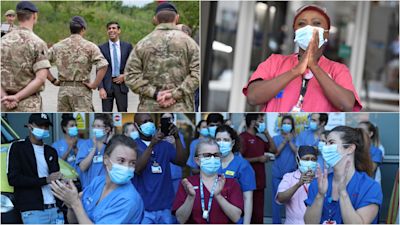Public sector pay rise announcement ‘kick in the teeth for social care staff’

Social care providers have accused the government of “sidestepping” the issue of low pay for care staff as it announced pay rises for thousands of key workers in the public sector.
While above-inflation pay rises have been announced for teachers, doctors, police, prison officers, National Crime Agency staff, members of the judiciary, armed forces and senior civil servants, no salary increase was announced for nurses and healthcare assistants.
Care associations called for action to replace “lip service”, following a gruelling few months of coronavirus during which frontline care staff have “put themselves in harm’s way”.
The government said nurses and healthcare assistants are covered by a three-year pay deal agreed in 2018.
More than 300 NHS workers have died in England alone after contracting the deadly virus, many doing so while caring for patients.
It is not known how many carers have died from the respiratory disease. The above-inflation pay rise announced by the chancellor on Tuesday will see almost 900,000 workers benefit, with teachers and doctors seeing the largest increase at 3.1% and 2.8% respectively, according to the Treasury. The Institute for Public Policy Research think tank said not including nurses and carers was “unforgivable” and an “unjustifiable snub”.
Morale in the social care workforce will also be damaged by the announcement, with one care provider group calling it the latest “kick in the teeth” from the government. Chief executive of Care England, Professor Martin Green, said: “These past few months have been an incredibly challenging time for our NHS and social care and it is imperative that frontline staff are recognised and rewarded as such. “We need to ensure that lip service is replaced by action in order to ensure the long term sustainability of the adult social care sector.”
Vic Rayner, executive director at the National Care Forum, which represents 120 of the UK’s social care charities, said: “It is unacceptable for the Government to sidestep the issue around social care workers’ pay in today’s announcement.
“Care workers have been a stalwart of the Covid front line and need recognition. This has never been a low-skilled job, and should never again be consigned as a low-paid role.
“We need the government to act now to ensure that each and every care worker is rewarded for their extraordinary work.”
Dame Donna Kinnair, chief executive of the Royal College of Nursing, said it is not acceptable to make nurses wait a year, adding: “In this year, of all years, it is time to value these professionals and begin to fill the tens of thousands of vacant posts.”
But even for junior doctors, the 2% pay rise will mean the majority have seen their wages fall by between £500 and £850 in comparison to senior colleagues in just two years, the Hospital Consultants and Specialists Association (HCSA) union said. The hospital doctors’ union said the announcement will “land a damaging psychological blow on England’s lowest-paid doctors”.
Explaining the government's decision over the pay rises, policing minister Kit Malthouse told ITV News: "[Nurses] are subject to a separate pay deal that was negotiated back in 2018, called Agenda for Change, which has seen significant change in starting salaries and other salaries and I think on average its a 4.4% pay deal.
"They're in the middle of that and no doubt the Department of Health will be talking to them about what happens in the future, when the time is appropriate."
Speaking on BBC Radio 4's Today programme, Mr Malthouse added social care workers would have to rely on increases in the minimum wage to improve their pay levels.
Mr Malthouse said: "The vast majority of social care workers are paid in the private sector so our ability to influence pay rates there is limited."
He added apart from "nationalising the entire thing", the minimum wage rate was the best tool the government had to recognise the efforts of care workers.
Here's a breakdown of the public sector professions that are getting a pay rise
School teachers will get a 3.1% pay rise
Doctors and dentists will get a 2.8% pay rise
Police officers will get a 2.5% pay rise
Armed forces will get a 2% pay rise
National Crime Agency will get a 2.5% pay rise
Prison officers will get a 2.5% pay rise
Judiciary will get a 2% pay rise
Senior civil servants will get a 2% pay rise
Senior military will get a 2% pay rise
Making the announcement, Chancellor Rishi Sunak said: "These past months have underlined what we always knew, that our public sector workers make a vital contribution to our country and that we can rely on them when we need them.
"It’s right therefore that we follow the recommendations of the independent pay bodies with this set of real-terms pay rises."
Each award is recommended by independent pay review bodies, and this year the government has accepted the suggested rise for each workforce.
The pay awards for the armed forces, prison officers, senior civil servants and NHS staff will be backdated to April.
The pay rise for police and teachers starts in September due to those professions operating on a different pay schedule - running from September to August.
Labour shadow chancellor Anneliese Dodds said the pay rise was "good news" but claimed it would not make up for a "decade of real-terms pay cuts" for frontline workers.
TUC general secretary Frances O’Grady called for social care workers to join the ranks of those being offered a pay rise.
"These rises are welcome, but there’s still a long way to go to restore pay after a decade of real terms cuts," she said.
"Many public sector workers, like job centre staff and local government workers, aren’t getting these rises. They deserve a decent pay settlement too."
Ms O'Grady added: "The government should urgently announce a pay rise for social care workers".